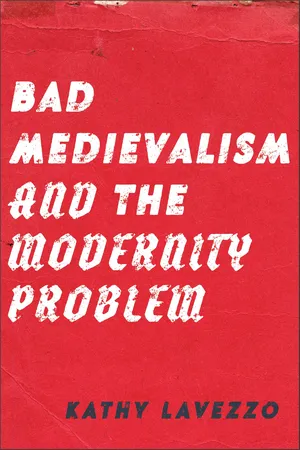
- English
- ePUB (mobile friendly)
- Available on iOS & Android
Bad Medievalism and the Modernity Problem
About this book
Challenges the assumptions made over the medieval/modern divide by examining the medieval roots of modern racism
Humanists have long insisted on a chasm separating modernity and the Middle Ages. In Bad Medievalism and the Modernity Problem, Kathy Lavezzo demonstrates how the temporal divide scholars typically accept is a fiction that has shaped racial discourse over a longue durée. The hard line drawn between "then" and "now" is of a piece with the line separating whiteness from humans deemed irrevocably other. Thus, Lavezzo advocates a "bad"—that is, depressing and disturbing, even nauseating—historicism attuned to the interpenetration of race, whiteness, and periodicity in the "west."
Teasing out the dialectical invocation of both periods by figures as diverse as W. E. B. Du Bois, Carolyn Bynum, Stuart Hall, Johan Huizinga, Paule Marshall, Karl Marx, Gloria Naylor, J. R. R. Tolkien, and Sylvia Wynter, Lavezzo demonstrates how the tension between and across categories of the "medieval" and the "modern" has mobilized intense emotional and political responses.
Inspired by Lavezzo's discovery that Hall, the beloved founder of cultural studies, planned as a student at Oxford to become a medievalist but was dissuaded from that path by his teacher Tolkien, Bad Medievalism and the Modernity Problem unpacks the implications of that charged encounter. Central chapters contrast Tolkien's white heritage medievalism with a speculative inquiry into the Piers Plowman dissertation that Hall never wrote.
Other chapters assess the white "feel" of periodization by scholars, including Jacob Burckhardt, Huizinga, Fredric Jameson, and Bynum, and draw on theorists, including Du Bois and Wynter, to chart the medieval roots of a racialized discourse of progress and primitivism. Bad Medievalism and the Modernity Problem culminates in new readings of Gloria Naylor's Bailey's Cafe and Paule Marshall's The Fisher King, demonstrating their importance as productively pessimistic engagements with the racial legacies of both the medieval and the modern.
Frequently asked questions
- Essential is ideal for learners and professionals who enjoy exploring a wide range of subjects. Access the Essential Library with 800,000+ trusted titles and best-sellers across business, personal growth, and the humanities. Includes unlimited reading time and Standard Read Aloud voice.
- Complete: Perfect for advanced learners and researchers needing full, unrestricted access. Unlock 1.4M+ books across hundreds of subjects, including academic and specialized titles. The Complete Plan also includes advanced features like Premium Read Aloud and Research Assistant.
Please note we cannot support devices running on iOS 13 and Android 7 or earlier. Learn more about using the app.
Information
Table of contents
- Cover
- Title Page
- Copyright
- Contents
- Preface
- Introduction: Race, Affect, Periodization
- Part I. White Mythologies of History
- Part II. Tolkien vs. Hall: White Heritage Fantasy and Diasporic Critique
- Part III. Black Feminist Modernism, Black Feminist Medievalism
- Acknowledgments
- Appendix: Stuart Hall’s First Publication
- Notes
- Index
- About the Author